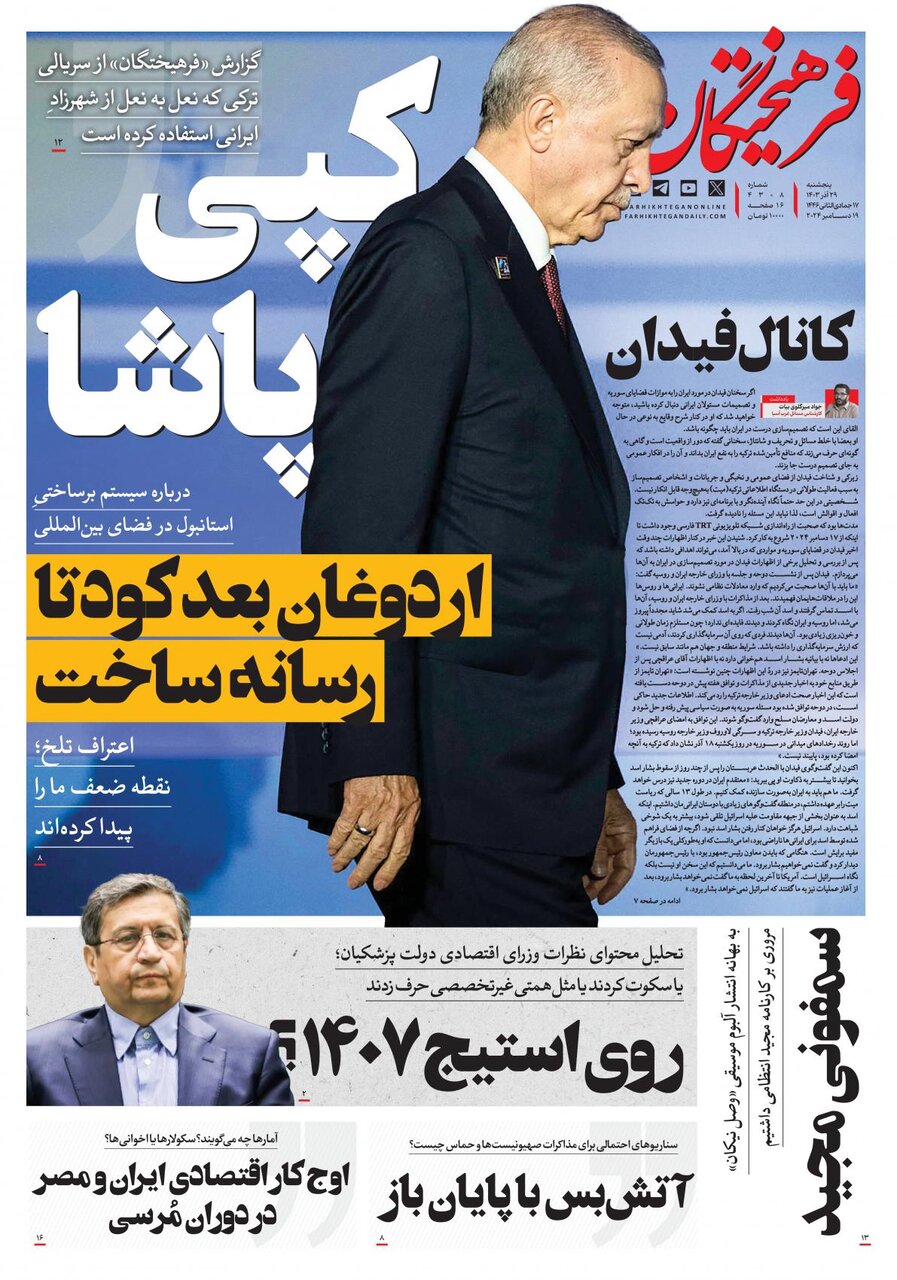Ankara's strategy with the Syria card

TEHRAN -In an article by Javad Mirgaloy Bayat, Farhikhtegan discussed Turkey's evolving diplomatic approach regarding Syria, specifically focusing on comments made by Hakan Fidan, Turkey's Foreign Minister.
Fidan, in his remarks, highlighted the importance of offering constructive support while also criticizing Iran's decision to resist certain pressures. The article emphasized that Fidan’s statements appeared to target segments within Iran’s political system that both support Resistance and may hold a more favorable view of Turkey's position. Fidan’s core message was that, in order to effectively strengthen Hezbollah's Resistance through Syria, it is crucial for Iran to address the issue of the so-called Zangezur Corridor and make necessary concessions. This is an issue that has already been discussed within various political circles in both Turkey and Iran. Furthermore, Fidan suggested that Iran should demonstrate greater cooperation in the northern and southern corridors to allow Turkey to provide more significant support to Lebanon’s Resistance efforts. The article speculates that this strategic shift is designed to ease tensions between Turkey and Iran while creating room for more collaboration in the region, particularly regarding Syria and Lebanon.
Keyhan: Whitewashing terrorists in Syria
In an analysis, Keyhan explored the shifting dynamics within Syria's armed groups. The article criticized the transformation of a terrorist leader, who was previously known for violent rhetoric, now presenting himself with a well-groomed appearance and Western-style philosophy. The article points out the change in tone, with the leader of this group, al-Julani, now adopting rhetoric about unity and social justice, which seems to echo Western political thought. The report argues that this shift is part of a broader strategy by Turkey, in coordination with the U.S. and Israel, to rebrand and revive the remnants of Daesh, employing new tactics after the failure of the original project. The piece warns that, despite superficial changes, the fundamental goal remains the same: to weaken Syria and its allies.
Jam-e Jam: Grossi's return to factory settings
In an article for Jam-e Jam, Mohammad Ghaderi criticized Rafael Grossi, Director-General of the International Atomic Energy Agency (IAEA), after his visit to Tehran. Ghaderi argued that Grossi’s recent actions demonstrate his lack of autonomy and his alignment with Western and Zionist interests. Despite Grossi’s attempts to present himself as a neutral actor seeking resolution, the article pointed out that his comments were more politically charged than fact-based, deviating from the technical focus expected from the head of a specialized organization like the IAEA. Ghaderi emphasized that Iran’s nuclear program, which is under full IAEA safeguards, is peaceful and in line with the country’s technical needs. He criticized Grossi for making political statements rather than sticking to the facts outlined in IAEA reports. The article argued that Grossi’s comments, particularly regarding Iran’s enrichment activities, create unnecessary hurdles and distort the role of the agency. Ghaderi asserted that Grossi’s remarks serve to undermine Iran’s rights under international law, highlighting that Iran has the right to pursue nuclear energy peacefully, without external interference.
Hamshahri: Western cognitive war against Iran
Mojtaba Zarei, a lawmaker sitting on the Parliament’s National Security and Foreign Policy Committee, wrote in Hamshahri about the ongoing cognitive and media warfare waged by the U.S. and its allies against Iran. Zarei argued that the U.S. and its partners are not only using economic pressure but are also actively engaging in campaigns to delegitimize Iran’s government and destabilize the country through domestic media manipulation and disinformation. The article identified the delegitimization of the government as a key tactic in this cognitive warfare. Zarei noted that certain domestic political groups, often in cooperation with foreign adversaries, portray the Iranian government as ineffective and corrupt. These attacks, he suggested, are designed to create a sense of helplessness and isolation within the executive branch. Zarei emphasized that such criticism must avoid being influenced by foreign propaganda and should be rooted in constructive dialogue. Another tactic, according to Zarei, is the creation of a dual power structure within Iran. By exploiting the inaction of certain officials, foreign powers create internal divisions that undermine the unity of the government. This, Zarei argued, erodes public trust in the government and weakens its legitimacy. He called for greater unity within Iran’s government, stressing that all branches should avoid internal conflicts and present a unified front to the people.
Leave a Comment